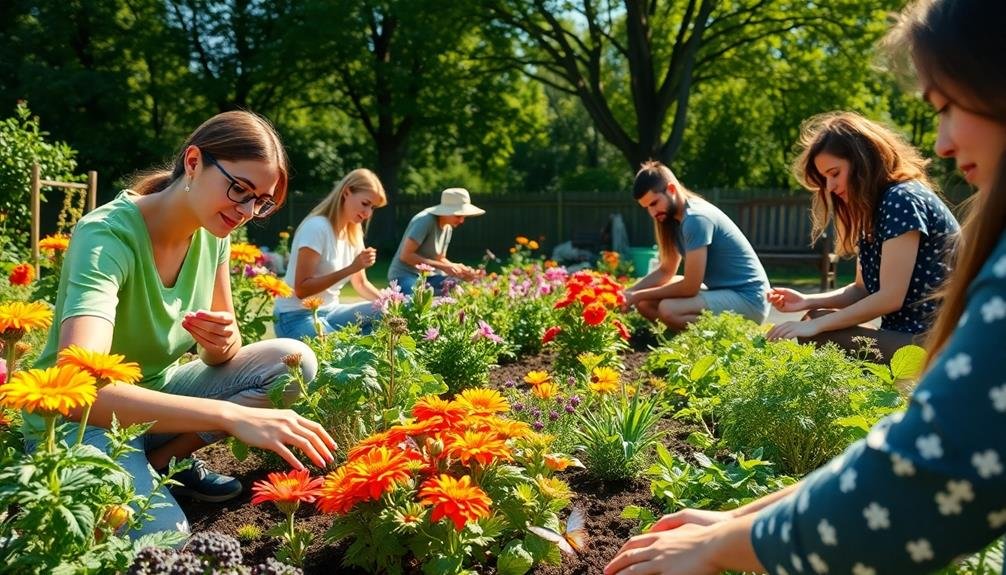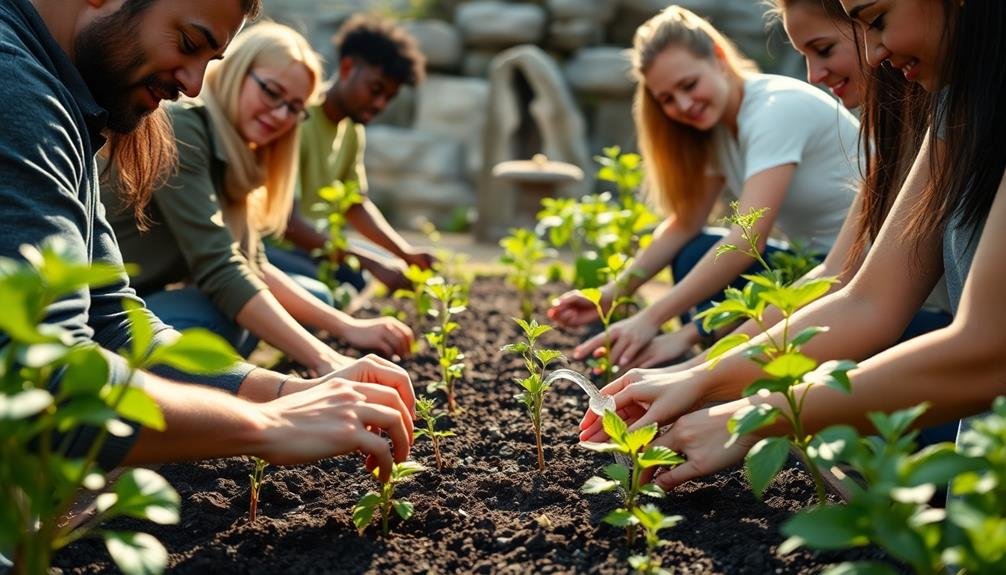Community gardens offer three powerful ways to calm your anxiety through volunteering. First, you'll experience nature's therapeutic touch, with calming environments and rhythmic activities that lower stress levels. Second, you'll forge social connections in green spaces, combating isolation and building camaraderie with diverse individuals. Third, you'll engage in mindful gardening practices, focusing on sensory experiences and present-moment awareness. These elements work together to reset your nervous system, enhance your mood, and foster resilience. By immersing yourself in these nurturing spaces, you'll discover a holistic approach to anxiety relief that goes beyond traditional methods.
Nature's Therapeutic Touch

Amidst the chaos of modern life, nature offers a soothing balm for our frayed nerves. When you step into a community garden, you're immersing yourself in a therapeutic environment that can greatly reduce anxiety. The simple act of touching soil, feeling the texture of leaves, and inhaling the fragrance of flowers triggers a cascade of calming responses in your body.
As you volunteer in these green spaces, you'll find yourself engaging in repetitive, mindful tasks like planting, weeding, and watering. These activities help ground you in the present moment, pulling your attention away from anxious thoughts. The rhythmic nature of gardening work can induce a meditative state, lowering your heart rate and blood pressure.
You'll also benefit from exposure to natural light and fresh air, which can boost your mood and improve sleep quality. The vibrant colors of plants and flowers stimulate your senses positively, while the gentle sounds of nature – rustling leaves, chirping birds – create a soothing auditory backdrop.
This multisensory experience in the garden helps reset your nervous system, providing a much-needed respite from the stressors of daily life.
Social Connections in Green Spaces
Beyond the individual benefits, community gardens foster invaluable social connections. When you volunteer in these green spaces, you'll find yourself part of a diverse community united by a shared purpose. You'll meet neighbors you mightn't have encountered otherwise, breaking down social barriers and fostering a sense of belonging.
As you work alongside others, you'll naturally engage in conversations, share gardening tips, and swap stories. These interactions can help combat feelings of isolation and loneliness, which often contribute to anxiety. You'll build a support network of like-minded individuals who understand the therapeutic power of gardening.
Community gardens also provide opportunities for intergenerational connections. You might find yourself learning from seasoned gardeners or sharing your knowledge with curious children. These cross-generational interactions can broaden your perspective and give you a sense of purpose.
Moreover, participating in community events like harvest festivals or gardening workshops can strengthen your social bonds. You'll celebrate shared achievements and overcome challenges together, creating a sense of camaraderie that extends beyond the garden fence.
This social support network can become a valuable resource for managing anxiety in your daily life.
Mindful Gardening Practices

Mindful gardening practices offer a powerful way to reduce anxiety while tending to your plants. As you work in the community garden, focus on each task with full attention.
Feel the soil between your fingers as you plant seeds, noticing its texture and temperature. Listen to the rustling of leaves and the chirping of birds around you. Breathe deeply, inhaling the scent of flowers and herbs.
When watering plants, observe how the water flows and nourishes the soil. Pay attention to the subtle changes in your plants' growth from day to day.
As you weed, concentrate on the gentle pulling motion and the satisfaction of creating space for desired plants to thrive.
Practice gratitude for the garden's bounty and the opportunity to nurture living things.
When you encounter challenges like pests or weather issues, approach them with curiosity rather than frustration. Use pruning as a metaphor for letting go of negative thoughts.
Frequently Asked Questions
How Do I Find Community Gardens in My Area?
You can find community gardens in your area by searching online directories, contacting your local parks department, or asking at community centers. Check social media groups, neighborhood associations, and local agricultural extensions for information on nearby gardens.
What Tools or Equipment Should I Bring to Volunteer?
You'll usually need gloves, a water bottle, and sturdy shoes. Bring a trowel, pruning shears, and a hat for sun protection. Most gardens provide larger tools, but check with the organizers beforehand to see if you need anything specific.
Are There Age Restrictions for Community Garden Volunteers?
You'll find age restrictions vary by garden. Many welcome volunteers of all ages, but some may have limits for safety reasons. It's best to check with the specific community garden you're interested in for their policies.
Can I Take Home Produce From the Community Garden?
You'll usually get to take home some produce when you volunteer at a community garden. It's often a perk of helping out. However, policies vary, so you should check with the garden's organizers about their specific rules.
How Much Time Commitment Is Required for Volunteering at Community Gardens?
You'll find that time commitments vary widely among community gardens. Generally, you can volunteer as little as a few hours monthly or up to several hours weekly. It's flexible, allowing you to choose what fits your schedule best.
In Summary
You've discovered three powerful ways community gardens can soothe your anxiety through volunteering. By immersing yourself in nature's therapeutic touch, fostering social connections in green spaces, and practicing mindful gardening, you're nurturing both plants and your mental health. Don't underestimate the impact of getting your hands dirty and connecting with others in a shared purpose. Next time you're feeling overwhelmed, consider reaching out to a local community garden. Your mind and spirit will thank you.





Leave a Reply